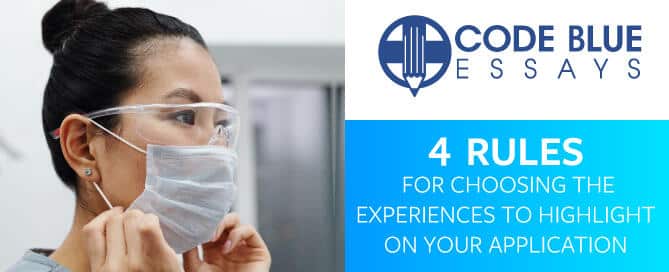Applying to medical school is a demanding process that requires meticulous attention to detail. Your application must showcase a range of experiences that demonstrate your qualifications, character, and readiness for a career in medicine. Beyond academic achievements, these experiences provide admissions committees with insights into who you are as a person. By following these four essential rules, you can effectively highlight the experiences that strengthen your application and leave a lasting impression.
Rule #1: Highlight Significant Experiences in the “Work and Activities” Section
The “Work and Activities” section is one of the most critical components of your medical school application. This section allows you to present your most meaningful accomplishments and experiences. Admissions committees prioritize the quality of these experiences over sheer quantity, so focus on selecting activities that reflect your dedication to the field of medicine.
When documenting each experience, include essential details such as dates, location, type of experience, contact information, and total hours. If you’ve maintained a clinical experience journal, it can serve as an invaluable resource for retrieving this information. Choose experiences that align closely with your journey into medicine, such as clinical exposure, community service, research, and leadership roles.
Avoid redundancy between the “Work and Activities” section and your personal statement. Use this section to provide additional depth and context, ensuring that every part of your application contributes unique value to your story.
Rule #2: Use Space Efficiently to Maximize Impact
The “Work and Activities” section allows up to 15 entries, but descriptions are limited to 700 characters per entry. Given this constraint, it’s essential to be strategic with how you present your experiences.
For instance, if you volunteered at a hospital for multiple summers, group these under a single entry with a unified description. Similarly, consolidate awards or recognitions related to the same activity unless one holds particular significance that warrants a separate mention. This approach helps you save space and ensures you have room to highlight a diverse range of impactful experiences.
Include experiences such as physician shadowing, community service (both medical and non-medical), and research. By thoughtfully grouping related activities and awards, you can present a comprehensive and organized account of your journey toward a career in medicine.
Rule #3: Select and Describe Your Most Meaningful Experiences
The “Most Meaningful Experiences” section provides an opportunity to delve deeper into three experiences that have significantly shaped your decision to pursue medicine. This section allows you to articulate the impact of these experiences and demonstrate your growth, commitment, and understanding of the medical field.
When choosing these experiences, prioritize those with substantial time commitments and meaningful personal or professional growth. For example, if a community service project exposed you to healthcare disparities, describe how this experience deepened your understanding of the challenges faced by underserved populations. Use personal reflections and specific details to present a compelling narrative that captures your unique perspective.
Leverage notes from a clinical experience journal, if applicable, to recall moments that left a lasting impression. This can help you create authentic and detailed descriptions that resonate with admissions committees.
Rule #4: Relate Every Experience to Medicine
Admissions committees seek candidates who can clearly articulate why they aspire to become physicians. Every experience you highlight should connect to the skills, values, or insights relevant to a medical career. This connection helps convey your passion and readiness for the field.
For example, if you participated in non-medical volunteer work, explain how the experience contributed to qualities essential for a doctor, such as empathy, communication, or leadership. Similarly, research experiences should highlight skills like critical thinking, attention to detail, and intellectual curiosity.
Ensure that every entry underscores your preparedness for the responsibilities and challenges of being a physician. By consistently linking your experiences to medicine, you create a cohesive narrative that reinforces your commitment to the field.
Additional Tips for Success
- Proofread for Clarity and Accuracy: Errors in grammar or formatting can detract from the overall professionalism of your application. Review your entries multiple times to ensure clarity and precision.
- Tailor to Each School’s Mission: Some medical schools emphasize specific values, such as serving underserved populations or advancing research. Tailor your application to reflect alignment with these values where applicable.
- Seek Feedback: Share your application with mentors, advisors, or peers to gain constructive feedback. They can provide insights into how your experiences are perceived and suggest improvements.
Final Thoughts
Crafting a compelling medical school application is an intricate process that goes beyond listing academic credentials. By focusing on significant experiences, using space effectively, selecting meaningful activities, and connecting them to your journey in medicine, you can create an application that resonates with admissions committees. Thoughtful presentation of your experiences will showcase not only your qualifications but also your dedication and readiness to make a difference in healthcare.
FAQs
1. Can I include non-medical experiences in my application?
Yes, non-medical experiences can be valuable if they demonstrate skills or values relevant to a career in medicine, such as leadership, teamwork, or empathy.
2. What if I don’t have research experience?
Research experience is not mandatory for all applicants. Focus on highlighting other impactful experiences that demonstrate your readiness for medical school.
3. How do I choose my most meaningful experiences?
Select experiences that had the greatest personal or professional impact and clearly connect to your motivation for pursuing medicine.
4. Should I include shadowing experiences?
Yes, physician shadowing is an excellent way to demonstrate clinical exposure and understanding of the medical profession. Highlight key takeaways from these experiences in your application.

